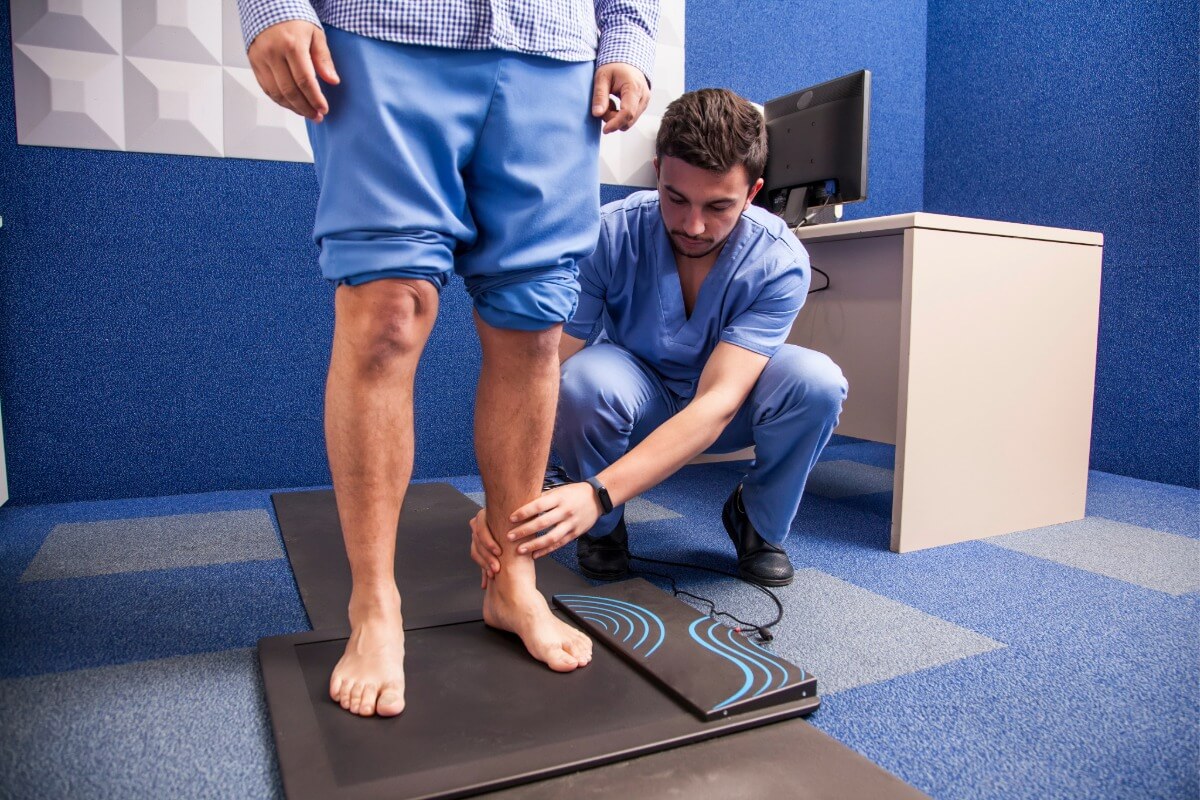The Link Between Diabetes & Foot Health: Why Podiatric Care Matters

Diabetes is a chronic condition that affects millions of people worldwide. While managing blood sugar levels is crucial for overall health, many are unaware of the significant impact diabetes can have on their feet. The truth is that there is a close connection between diabetes and foot health.
This article explores the connection between diabetes and foot problems, highlighting the importance of podiatric care for effective management and prevention.
Understanding the Risks: Diabetes and Foot Health Challenges
Diabetes affects how your body uses blood sugar (glucose) for energy. Over time, uncontrolled blood sugar levels can damage nerves and blood vessels throughout the body, including those in your feet. This can lead to a number of complications that significantly impact foot health.
Here are some of the common diabetic foot complications you should be aware of:
- Diabetic Neuropathy: This is nerve damage that can cause numbness, tingling, or burning sensations in the feet. Neuropathy can also lead to a loss of feeling, making it difficult to detect injuries like cuts or blisters.
- Poor Circulation: Diabetes can narrow blood vessels, reducing blood flow to the feet. This can slow down healing and increase the risk of infection.
- Foot Ulcers: These are open sores that develop on the feet due to poor circulation and nerve damage. Even minor injuries can progress into serious ulcers if left unnoticed or untreated.
- Diabetic Foot Infections: When cuts or ulcers become infected, it can lead to serious complications like gangrene, which may necessitate amputation.
These complications can be debilitating and even life-threatening if left unchecked. The beneficial news? With proper care and management, you can significantly reduce your risk of developing these problems.
Why Podiatric Care Matters: Your Ally in Foot Health
A podiatrist is a healthcare professional specializing in the diagnosis and treatment of foot and ankle conditions. When it comes to diabetes and foot health, podiatric care plays a vital role in prevention, early detection, and management of complications.
Here's how a podiatrist can be your ally in maintaining healthy feet:
- Comprehensive Foot Examinations: Regular podiatric exams are critical for early detection of any potential problems. Podiatrists can assess nerve function, blood flow, and skin integrity to identify issues before they become serious.
- Education and Empowerment: Podiatrists can educate you on proper foot care practices specifically tailored to manage diabetes. This includes daily foot checks, proper cleaning techniques, and selecting the right footwear.
- Early Intervention: Early detection of foot problems allows for prompt intervention, preventing them from developing into more serious complications. This can save you from discomfort, pain, and potentially even limb-threatening situations.
- Treatment for Existing Foot Problems: Whether you're experiencing neuropathy, ulcers, or other diabetic foot problems, a podiatrist can provide effective treatment options to manage the condition and promote healing.
By prioritizing podiatric care, you're taking a proactive approach to your foot health and becoming an active participant in managing your diabetes.
Tips for Healthy Feet: Simple Steps, Big Impact
Here are some practical tips you can incorporate into your daily routine to maintain healthy feet and minimize the risk of complications:
- Daily Foot Checks: Make it a habit to inspect your feet every day for any cuts, blisters, redness, swelling, or changes in skin texture.
- Washing and Drying: Wash your feet daily with warm water and mild soap, paying particular attention to the areas between your toes. Dry them thoroughly, especially between the toes, to prevent fungal infections.
- Blood Sugar Control: Maintaining good blood sugar control is essential for overall diabetic health and reduces the risk of foot complications. Work with your doctor to develop a personalized blood sugar management plan.
- Footwear Matters: Choose well-fitting, comfortable shoes with adequate arch support and a seamless interior to avoid irritation. Avoid tight-fitting shoes that can restrict circulation.
- Foot Hygiene: Practice excellent hygiene habits for your feet. To avoid ingrown nails, keep your toenails trimmed straight across. Avoid using harsh chemicals on your feet, and moisturize regularly to prevent dry, cracked skin.
- See a Podiatrist Regularly: Schedule regular appointments with a podiatrist for comprehensive foot exams and preventive care. This is critical for early detection and management of any potential problems.
Remember, taking care of your feet is an essential part of diabetes management. By following these tips and seeking professional podiatric care, you can significantly reduce your risk of complications and maintain healthy, active feet for a long and fulfilling life.
Don't wait until you experience foot pain or other problems to seek help. If you have diabetes, prioritize your foot health and schedule a consultation with a podiatrist today.
Take Control of Your Foot Health -Call Us (925) 464-1982 orSchedule an Appointment with Diablo Foot & Ankle's experienced Podiatrists.
Related articles
Request your podiatry consultation now
Fill out our contact form for a prompt call back. Diablo Foot & Ankle: Premier podiatry group in Walnut Creek & Antioch

.svg)

.svg)
.svg)





